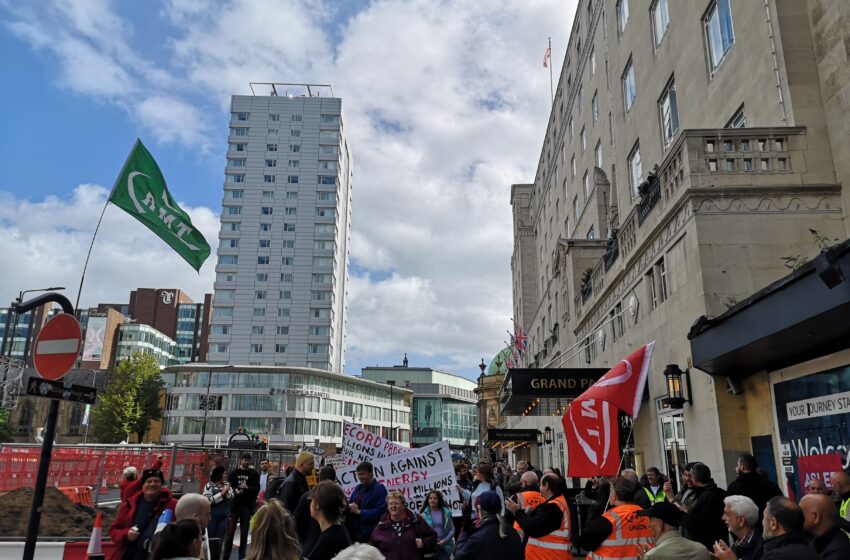
Weekend of Chaos? Railways or Westminster
As costs of living rise across the country, we’ve seen growing industrial action by unions in recent months, described as “weekend[s] of chaos” by outlets such as The Times, and this only seems set to continue as winter draws near. The Rail, Maritime, and Transport Union (RMT) is planning to strike again on the 3rd, 5th, and 7th of November, stopping almost all trains nationwide and throwing transport networks into a state of disarray. As the Conservative government plans new legal measures to make this kind of industrial action more difficult and the Labour Party strategically avoids backing the strikes, the unions face attacks from all sides. Up against anti-union legislation reminiscent of the Thatcher era, trade unions are also seeing a surge in public support from those equally affected by the cost-of-living crisis, bringing the debate over the strikes to the forefront of British politics.
The government’s new Transport Strikes Bill would, if passed, impose a minimum service level required during strikes, requiring a number of staff to continue working on strike days and stripping workers of their protection from dismissal if they still choose to strike. Denounced as ‘draconian’ by the RMT, this bill highlights the divide between strikes’ supporters and the measures that the government claims are necessary to keep disruption to a minimum.
And what of the workers?
Reflecting concerns about the impact on their members of the cost-of-living crisis, the RMT are striking to secure an inflation-line pay rise and to protect their terms and conditions. These are incredibly important regulations negotiated between the union and their employers which protect workers’ rights. Network Rail – the organisation which manages the nation’s railways and is responsible for negotiating with the unions – is currently offering an 8% rise alongside other benefits. Yet as inflation hits 10.1%, the RMT is calling this unacceptable: declaring it a real terms pay cut, alongside an attack on union members’ terms and conditions. Mick Lynch, leader of the RMT denounced the direction of the negotiations: “The dishonesty of Network Rail bosses has reached a new low in this national rail dispute.”
The dishonesty of Network Rail bosses has reached a new low in this national rail dispute.
Mick Lynch
While striking and militant union action has been a core part of the British labour movement for centuries, the scale of the rail strikes’ disruption to national infrastructure has been divisive across the political sphere. The Labour Party, historically the party of the unions, has been split over whether to support industrial action. Some Labour MPs, such as former Shadow Minister for Buses and Public Transport, Sam Tarry, faced disciplinary action after appearing on picket lines. He was removed from the Shadow Cabinet and has since been deselected as MP for Ilford South.
Nearly a century since Britain’s only general strike, more people than in 1926 – 1.9 million across professions including rail workers, barristers, and nurses– are polling or have voted to strike in the coming months. The nearly unprecedented scale begs the questions to what point will disruption be tolerated, and for how long the strikes will be considered justified. In 1926, the General Strike was perceived to be a failure, only lasting nine days, with its effects largely mitigated by an army of middle-class volunteers who were organised by the government to maintain essential services. This demonstrates a historic response to strikes demanding better conditions – broadly unsympathetic from both government and the public. But an unstable government and deepening recession may demonstrate a change in this relationship.
It seems, however, that the British public is not as divided by the strikes as the policies of those in parliament lead us to believe. Polling by Savanta Comres in August indicated that 48% of Brits support rail strikes over pay and conditions, while only 31% of those surveyed declared themselves to be opposed. Further, 59% said that they were supportive of workers striking more generally. But, as strikes seem set to continue throughout the winter, and unions declare their intents to strike simultaneously, the support of the British public may yet be tested.
Faced with the universality of the cost-of-living crisis and the chaos of contemporary government, Britons appear far more understanding of striking workers and more amenable to the idea of broader industrial action. Trust in the government is hitting record lows – according to a recent YouGov poll, 77% of the population disapprove of the current government, and 71% of those polled reported that Liz Truss was doing a bad job as Prime Minister before she resigned on the 20th of October. It remains to be seen how another wave of changes in Westminster might reassure a doubtful public.
The relationship between these concerns and the current strikes is reflected in the Enough is Enough protest movement, which has consciously linked itself to the strikes and drawn connections between the effects of the cost of living crisis and workers’ fights for recognition and better pay. After a nationwide wave of protests at the beginning of this month and faced with rising inflation and a collapsing government, union organising is beginning to be seen as a more viable option to stay safe from economic turmoil – worth the disruption that it causes.
Header image credit: Gabriel Kennedy

